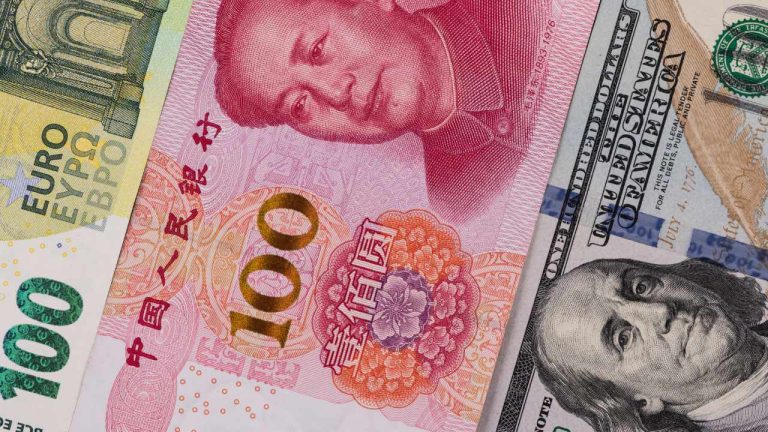
A senior economist at financial services firm TD says the Chinese yuan, the euro, and digital currencies could erode the U.S. dollar’s dominance. “Several countries have shown frustration with the dominance of the dollar and are pursuing alternatives for conducting international trade and cross-border banking,” he said.
Long-Term Trend Is Away From US Dollar, Says Economist
Vikram Rai, a senior economist at financial services firm TD, discussed the global de-dollarization trend and currencies that have the potential to diminish the dominance of the U.S. dollar in a note published last week. He specifically mentioned the Chinese yuan, the euro, and central bank digital currencies (CBDCs) as noteworthy challengers.
While stating that the U.S. dollar “remains the dominant and most-used currency,” the economist stressed that “the long-term trend is away from it.” He described:
Several countries have shown frustration with the dominance of the dollar and are pursuing alternatives for conducting international trade and cross-border banking.
Rai emphasized that the U.S. government’s decision to freeze the foreign currency reserves of the Russian central bank in February 2022 “has motivated some countries to make greater efforts to reduce their dependence on dollars.”
He noted that China has been at the forefront of de-dollarization efforts, adding that the country has pushed to trade crude oil in Chinese yuan and to conduct its trade with Brazil, India, and Russia in the renminbi (RMB) or local currencies. The senior economist explained that “The challenge to the ‘petrodollar’ is significant, both economically and symbolically,” citing that nearly 80% of global oil sales have been priced in U.S. dollars since the 1970s, creating significant demand for the USD.
There are also “other incremental efforts to chip away at the dollar’s status,” he stressed, mentioning the proposed common BRICS currency that is expected to be discussed at the economic bloc’s upcoming leaders’ summit. However, he opined: “A full-fledged currency union between such disparate economies is unlikely to come to pass, but the announcement signals a commitment to conduct more of their trade and finance without dollars.”
Yuan, Euro, and Cryptocurrencies
While pointing out that the U.S. dollar is still more widely available and freely convertible than the euro and the Chinese yuan, he identified these two currencies as the primary contenders against the USD. The economist stated:
The largest challengers to the dollar today are the euro and the RMB.
The Chinese yuan faces certain hurdles in its path to potentially replace the U.S. dollar as the global reserve currency, he detailed, adding that the yuan “is not freely convertible, nor is it available in great supply outside of China today, making it a challenging choice.”
Rai also believes that digital currencies could chip away at the U.S. dollar’s dominance, stating:
Digital currencies, including central bank digital currencies, are another challenge to the system of dollar dominance. Widespread adoption of other digital currencies could erode the dollar’s position by removing the need to use it as a vehicle for settling payments.
However, he pointed out that the majority of central banks are currently in the early stages of experimenting with central bank digital currencies. Once they complete the initial phases of their work, “We expect several years of work lie ahead in determining the legal and governance framework for central bank digital currencies,” the economist shared.
Moreover, Rai said:
Digital platforms, including cryptocurrencies and central bank digital currencies, may one day offer an alternative.
He concluded: “Within the next decade or two, there is great potential for regionally-dominant currencies and a multipolar international regime to emerge, with the roles filled now by the dollar shared with the euro, a more open yuan, future central bank digital currencies, and possibly other options we have yet to see.”
Do you agree with TD economist Vikram Rai? Let us know in the comments section below.
Comments
Post a Comment